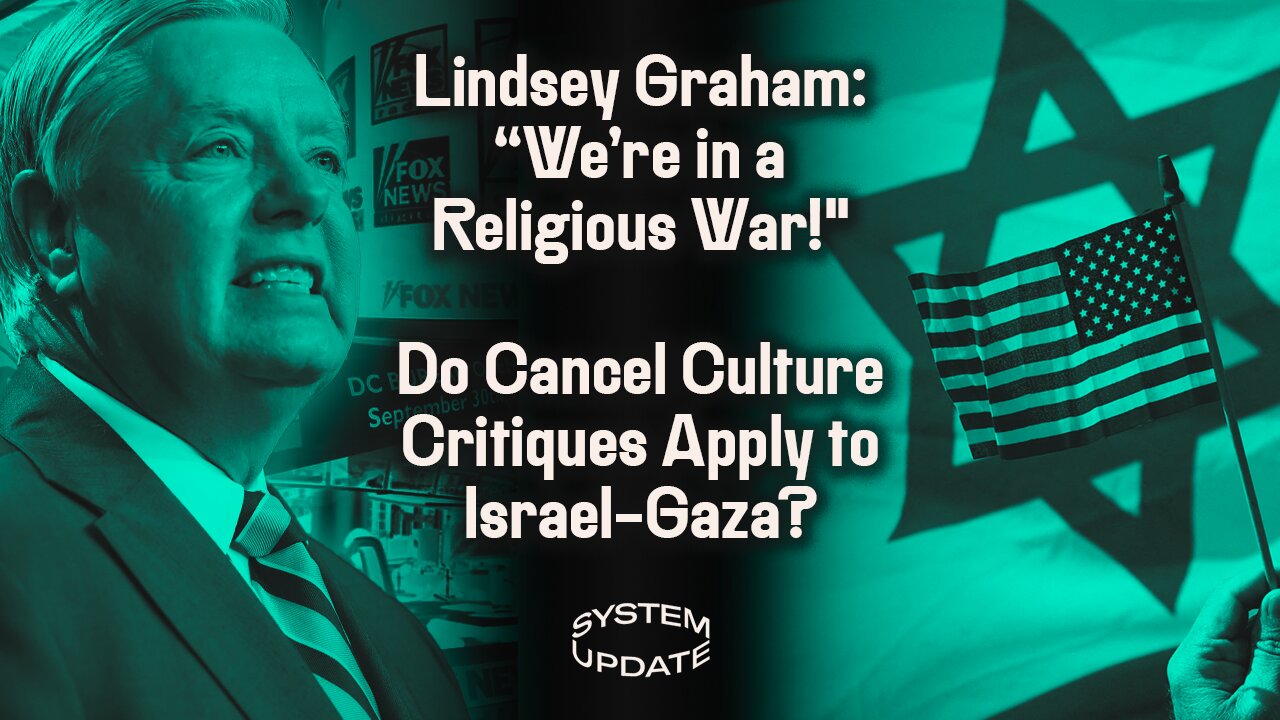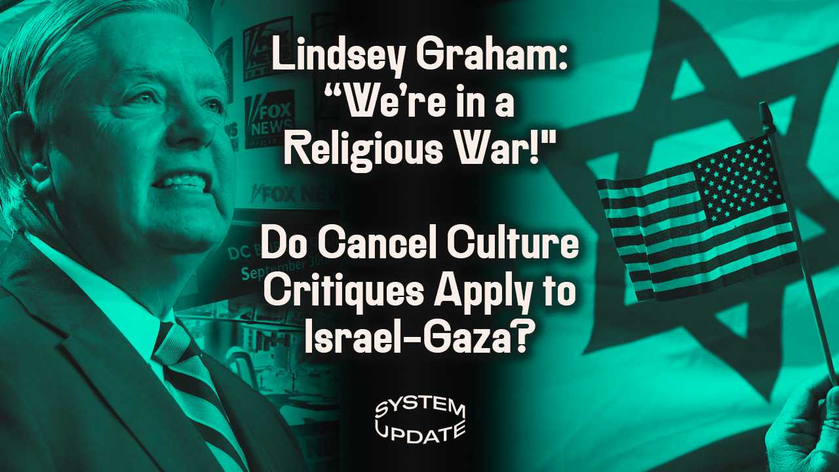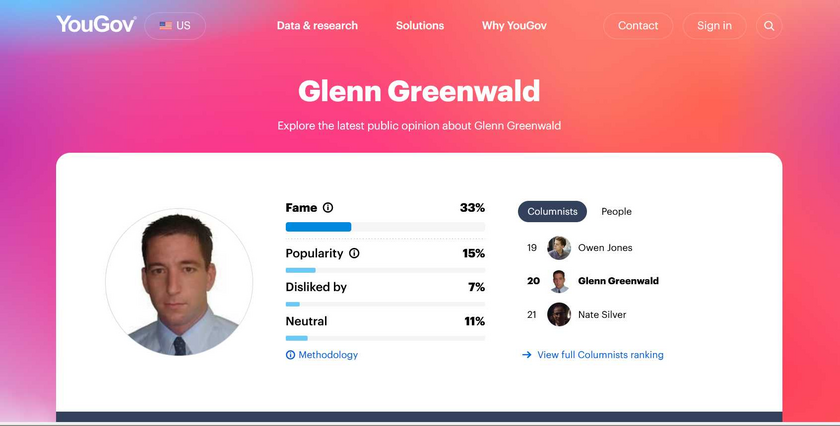Watch the full episode here:

Good evening. It's Wednesday, October 11.
Tonight: The war between Israel and Gaza is now in its fifth full day, and each day brings new escalation, new forms of violence, and extreme levels of civilian deaths on both sides of the border. It should not be surprising that virtually the entire political class in Washington sides with Israel – as we documented on Monday night show, support for Israel has been a centerpiece of bipartisan U.S. foreign policy for decades, and numerous politically influential groups in the U.S. feel a strong affinity for Israel for all sorts of political, geostrategic, cultural and religious reasons.
While this pro-Israel sentiment is not surprising, it is most definitely necessary to discuss this question. To what extent are Israel's wars in general, as well as its new war in particular, also America's wars? Republican presidential candidate Nikki Haley said on Sunday, one day after this war began, “This is not just an attack on Israel. This was an attack on America.” Today, her fellow South Carolinian Senator Lindsey Graham, who treats every actual and proposed American war exactly the same way, he vocally cheerleads every last one of them went even further. Then, Governor Haley, in a Fox interview today said “We are in a religious war.” Is this true? When Israel is involved in a war, does it automatically mean that the U.S. is also involved in this new war as a participant? Is it possible as an American citizen to oppose U.S. government involvement in an Israeli war without being guilty of being “pro-Hamas,” similar to the way that Americans who opposed our government's role in the war in Ukraine are called pro-Putin, or how Americans who oppose their government's role in Syria were called pro-Assad, or how those who dissented from any parts of the Bush-Cheney War on Terror were accused of being on the side of the terrorist or pro-al-Qaida? Given the emergence of these kinds of statements from people like Lindsey Graham and Nikki Haley, it is more vital than ever to ask what the proper U.S. role in this war is.
Then: Many media careers have been built over the last several years, very thriving and lucrative media careers based on a professed belief in free speech and opposition to what is called “cancel culture”,” which – we have long heard – has been typically practiced by the left: an attempt to suppress or punish the expression of views they like, dislike and rregardedas dangerous, hateful and likely to incite violence. We're now hearing it, it seems, from the other side. Yesterday, the quite conservative British home secretary, when speaking about pro-Palestinian protests in London, declared the following: “Waving a Palestinian flag or singing a chant advocating freedom for Arabs in the region may be a criminal offense.” Waving the Palestinian flag or chanting about freedom for Arabs in the region – If you do that in the UK, you may be committing a criminal offense. In Canada, the mayor of Toronto accuses pro-Palestinian protesters of having broken the law by failing to obtain necessary protest permits. The same argument Canadian officials invoked last year, to argue that those trucker protests against COVID mandates were also illegal. Oh, they didn't get the right permits. Meanwhile, in the United States, many prominent figures, including ones who have long denounced the evils of censorship and what they call “cancel culture”, meaning punishing private citizens for expressing widely unpopular views, especially when those views are declared to be hateful or inciting of violence, have spent this week compiling the names of students, a list of students at American universities, who signed pro-Palestinian statements and have devoted themselves publicly to pressuring companies, private companies, sometimes successfully, to fire those people for having signed those statements or announcing and committing to the fact that they will refuse ever to hire such people. Is this a violation of their previously stated opposition to censorship and “cancel culture”? Or is there something special and unique about this particular debate when it comes to Israel that renders such threats of criminalization from government officials or campaigns to have people fired for their views uniquely justified?
And then: The Wall Street Journal on Monday purported to have confirmed that top Iranian officials directly planned and helped organize Saturday's attack on Israel, a claim that has been repeated by numerous presidential candidates and officials, including both Nikki Haley and Lindsey Graham and others as well. This is obviously quite inflammatory claim. Recall that similar claims about Saddam Hussein's participation in planning the 9/11 attack are what led many Americans to support the regime change war against Iraq because they thought Iraq had helped attack the United States.
Even U.S. and some Israeli officials have quickly denied knowledge of any such linkage between Iran and this attack. But some vocal anti-Iran voices, while some are also calling into question the veracity of this report, others have started to beat the drums of war against Iran. It illustrates how there are a lot of influential sectors in American political media circles that crave conflict with Tehran. This raises the question, I think, how many wars with how many different countries is the U.S. supposed to be fighting? The U.S. government is already heavily involved in one dangerous proxy war by using Ukraine to fight against and weaken the world's largest nuclear power, which is Russia. The U.S. is already heavily involved in this new Middle East war in similar ways by feeding Israel the money and weapons to wage this war and has even deployed major aircraft carriers to the region. At the same time, a non-trivial number of influential people in the U.S. see China as the gravest American enemy. And there is open talk in many key circles about how the likelihood of ending up in a hot war with Beijing is very real, especially if they harass or invade Taiwan. Most Americans in positions of influence, including the president, say they would go to war against China if that happened. There are a lot of wars already, serious, dangerous wars against countries with serious militaries. Should Iran a country three times the size of Iraq with a much more sophisticated military, be added to the list of the countries the U.S. is supposed to be considering, not just an enemy, but one that we should be preparing for a possible war against? The Wall Street Journal article made that possibility much more likely by announcing, seemingly with very little proof, that Iran was the key organizer of this attack on Israel.
Finally, it is a notable paradox that the Israeli media contains many voices urging restraint in how Israel uses military force in Gaza to avenge Saturday's attacks by Hamas. They argue, and we'll show you a couple of representative voices that there is a crucial distinction between Hamas on the one hand and Palestinian civilians on the other. They argued the lives of Gazans, ordinary Palestinians have value, especially given that half of its 2.2 million population is composed of children, people under the age of 18. They further argue that Israel must observe basic humanitarianism and long-standing laws of war to avoid indiscriminately extinguishing massive amounts of innocent Palestinian lives.
This is a view heard, paradoxically, I think, more by the Israeli media than in the U.S. media. So, I think it's worth asking, especially as we examine the latest wreckage and death and destruction in Gaza, whether that argument that some Israelis are making is correct while there are a few people who have done so, there is nobody of any prominence in the United States who is cheering or defending or justifying the horrific atrocities committed by Hamas against Israeli civilians, including children on Saturday. Any decent person, by definition, values innocent civilian life of all kinds, including obviously Israelis, and reacts with horror and disgust when seeing those videos from Israel on Saturday and believes it's always morally reprehensible to deliberately target civilian lives. The question, sadly prompted by our current discourse in the United States, including calls for the complete eradication of Gaza, is whether this basic humanitarian principle that innocent lives have value, whether that applies to Palestinian as well as to Israeli lives.
For now, welcome to a new episode of System Update, starting right now.

























